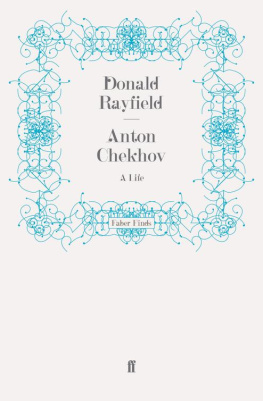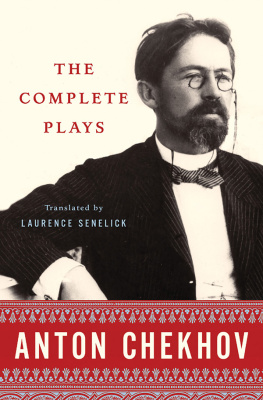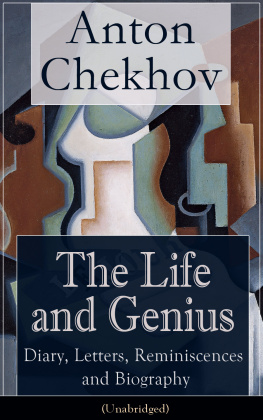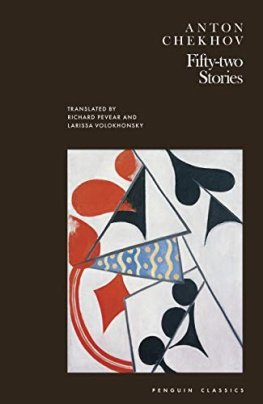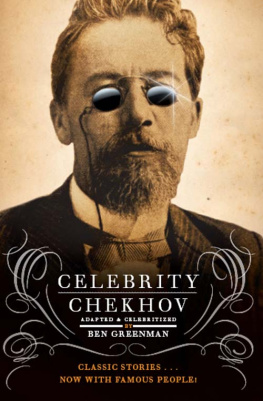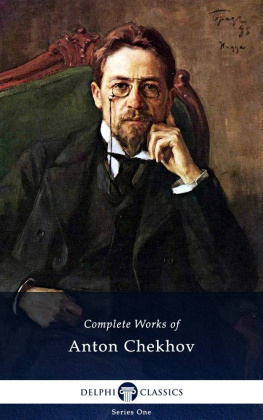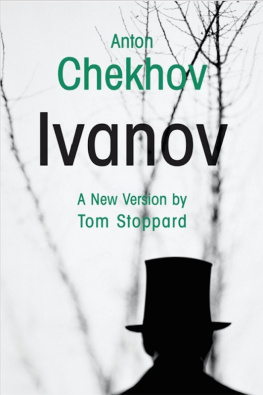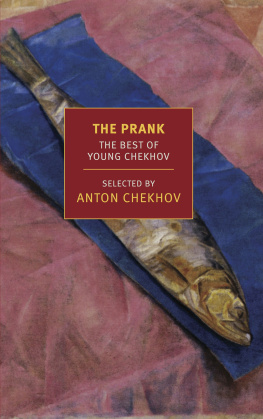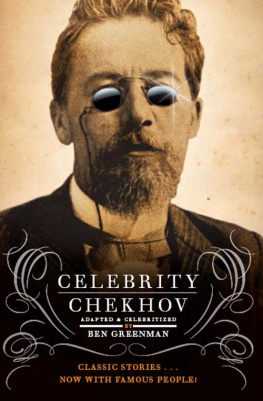Anton once told me, In time all my things must see the light of day and I have no reason to be ashamed of them.
Bykov to Maria Chekhova, 7 April 1910 (LN87, 356)
We recognize Anton Chekhov today as a founding father of the modern theatre, where the author, not the actor, is king. We acknowledge him as the author who gave Europes narrative fiction a new ambiguity, density and subtle poetry. Of all the Russian classics he is, to non-Russians especially, the most approachable and the least alien, whether on the stage or the printed page. He lets his reader and spectator react as they wish, draw their own conclusions. He imposes no philosophy. Chekhovs approachability is inseparable from his elusiveness. It is very hard to say what he meant, when he so rarely judges or expounds. From Tolstoys or Dostoevskys fiction we can reconstruct a philosophy and a life. From Chekhovs work, and from his many letters, we get only fleeting and contradictory glimpses of his inner world and experience. His many biographers have tried to build out of the evidence a consensual life of a saint a man who in a life shortened by chronic illness pulled himself from poverty to gentility, became a doctor and tended to the oppressed, won fame as the leading prose-writer and dramatist of his time in Europe, was supported all his life by an adoring sister and, though too late, found happiness in marriage with the actress who interpreted him best.
All biography is fiction, but fiction that has to fit the documented facts. This life of Chekhov tries to encompass rather more than has been documented before. The picture of Chekhov is now more complex . If, however, the man that emerges is less of a saint, less in command of his fate than we have hitherto seen him, he is as much a genius and no less admirable. His life should not be seen as an adjunct to his writing: it was a source of experience that fed his fiction. It is, above all, a life enthralling for its own sake. Anton Chekhov suffered the irreconcilable demands of an artist with responsibilities to his art as well as to his family and friends. His life has many meanings: we read into it the story of a disease, a modern version of the Biblical Joseph and his Brothers, or even the tragedy of Don Juan. Chekhovs life could be a novel by Thomas Mann about the unbridgeable gap between being an artist and a citizen. It also exemplifies the predicaments of a sensitive and talented Russian intellectual at the end of the nineteenth century one of the richest and most contradictory periods in Russias political and cultural history.
Few writers guarded their privacy from the public eye as assiduously as Chekhov. Yet no writer so carefully preserved and filed every scrap of paper letters, bills, certificates connected with him and his family. Nor did his proclaimed autobiographophobia prevent him from sorting out the years letters into cartons every Christmas.
There are many biographies available some comprehensive, such as E. J. Simmonss or Ronald Hingleys, some flamboyant, such as Henri Troyats, some finely judged, such as Mikhail Gromovs or V. S. Pritchetts. Russian or not, they all use the same range of printed sources. Nearly five thousand letters written by Anton Chekhov have been published, but several have been severely bowdlerized. (The import of another fifteen hundred letters, now lost, can be inferred from the replies.) These sources, notably the complete works and letters in thirty-one volumes published in Moscow between 1973 and 1983, have a remarkably full and intelligent scholarly apparatus, all of which provides biographers with an enormous range and quantity of material.
The untapped sources are just as vast. In the archives, principally the Manuscript Department of the Russian State Library (once the Rumiantsev Museum, then the Lenin Library), there are some seven thousand letters addressed to Anton Chekhov. Perhaps half of the letters in the archive have never been referred to in print, primarily letters that reflect Chekhovs private life. Moreover, in various archives (notably the Russian (formerly Central) State Archives for Literature and Art, the theatrical museum archives in Petersburg and Moscow, the Chekhov museums in Taganrog, Melikhovo and Sumy) there is a mass of documentary and pictorial material, letters of contemporaries which shed light on Chekhovs life as a writer and a man. Archival records show that a small circle of Russian scholars have over the last thirty years combed these sources thoroughly, yet their published work, detailed in the bibliography of this book, uses only a fraction of these sources. A Russian and Soviet tradition of not discrediting or vulgarizing (the phrase comes from a 1968 Central Committee resolution forbidding publication of certain passages) has even today made Russian scholars hesitant about bringing the full range and depth of the Chekhov archives into the public domain. Three years work systematically searching, transcribing and mulling over the documentation has convinced me that nothing in these archives either discredits or vulgarizes Chekhov. Quite the opposite: the complexity, selflessness and depth of the man become even clearer when we fully account for his human strengths and failings.
Chekhovs life was short, but neither sweet nor simple. He had an extraordinary number of acquaintances and liaisons (though few true friends and lovers). He moved in many orbits he had dealings with teachers, doctors, tycoons, merchants, peasants, bohemians, hacks, intellectuals, artists, academics, landowners, officials, actresses and actors, priests, monks, with officers, convicts, whores, foreigners and landowners. He got on well with people of every class and condition, except the nobility and court. He lived for virtually all his life with his parents and sister, and much of the time with one or more of his brothers as well, not to mention a network of aunts and cousins. He was restless: he had countless addresses and travelled widely from Hong Kong to Biarritz, from Sakhalin to Odessa. To write a full biography would take a lifetime longer than Chekhovs own. I have concentrated on his relationships with family and friends, but there is a sense in which his life is also a historiamorbi. Tuberculosis shapes it and ends it: his efforts to ignore and to cope with disease form the weft of any biography. There are many works in English offering a critical study of his work. If we read about Chekhov, it is primarily because he is a writer of very great importance. Any good bookshop or library offers a number of critical studies to enrich the readers understanding of Chekhovs work. In this biography, however, his stories and plays are discussed inasmuch as they emerge from his life and as they affect it, but less as material for critical analysis. Biography is not criticism.

